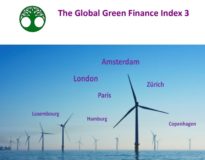Amsterdam and London continue to lead the latest global rankings of green financial centres, according to the latest edition of the Global Green Finance Index. Copenhagen, Zurich and Paris are close behind.
The Global Green Finance Index (GGFI) is published every six months and ranks global financial centres according to the depth and quality of their green finance offerings. In today’s report, GGFI 3:
- Amsterdam came first for depth, with Zurich and Copenhagen equal second. London dropped to fifth place
- In the quality rankings, London and Paris retained the leading two places
- In North America, Montreal came first for depth and San Francisco first for quality, although Canadian centres outperformed the US
- In Asia/Pacific, Shanghai came first for depth, and Sydney took the top place for quality
- Casablanca, São Paulo, and Prague topped the rankings for both depth and quality in their regions
- The biggest improvers were San Francisco, Toronto, and Vienna, which moved up five or more places in the depth index. Munich, Copenhagen, Toronto, and Madrid moved up five or more places for quality
- Renewable energy investment, sustainable infrastructure finance, and green bonds remained the areas of most interest to finance professionals.
GGFI 3 includes a special supplement on fossil fuel disinvestment, which looks at additional survey data and green and brown financing data in financial centres. We find that:
- Some financial centres have a high level of exposure to fossil fuel activities and are most at risk from a future deflation of the ‘carbon bubble’
- There is no clear link between a financial centre’s green finance reputation and its fossil fuel activities: some GGFI leaders host large amounts of fossil fuel financing, while the largest fossil fuel financing centres are spread throughout the GGFI index rankings. The financial centres with the highest volumes of disclosed GHG emissions (scope 1 and 2) based on companies listed in their stock exchanges were New York, Moscow, Paris, Shanghai, London, Frankfurt, Milan, Tokyo, Madrid, and São Paulo.
- There is support for policy interventions to facilitate fossil fuel disinvestment, with preferred solutions including regulatory disincentives around carbon, carbon pricing, and mandatory disclosure.
Nicolas Mackel, Chief Executive of Luxembourg For Finance, said:
“The GGFI provides the sustainable finance industry and policymakers with deep insights, clarity, and understanding on an international level on what works and what does not. This information allows us to assess, measure, and grow our financial centres’ sustainable finance activities.”
Professor Michael Mainelli, Executive Chairman of Z/Yen Group, said:
“The index results also appear to show that there is a premium to be gained from demonstrating leadership in particular sectors or products, for example, Luxembourg on green bonds, London in relation to insurance, or ESG equity in Hamburg. The GGFI shows that financial centres can improve their green finance offerings through specialisation, collaboration, and leadership, all of which can be encouraged by policy frameworks.”
Benoît Lallemand, Secretary General of Finance Watch, said:
“Two things stand out from this edition of the GGFI. First, financial centres which derive a large proportion of their revenues from fossil fuel investments do not suffer worse perceptions of their green finance leadership. This disconnect calls for our continued effort to obtain, understand and disseminate green and brown data. Second : policy frameworks are deemed the main driver for greening, which should encourage policymakers around the world to be bold. The two findings are closely related: policymakers would make data more available by implementing mandatory disclosure based on an ambitious green and brown taxonomy.”
André Hoffmann, President of MAVA Fondation pour la Nature, said:
“Financial centres are uniquely well placed to drive the changes in incentives and understanding needed to achieve sustainable economic transition. Today’s report underlines the strong support among market participants for policymakers to intervene, to catalyse growth in this sector, to drive the shift away from fossil-fuel investment, and to shape the financial system to support sustainability goals.”
Mark Campanale, Founder & Executive Director, Carbon Tracker
“Financial centres such as London and New York must address their own challenges in the energy transition; in particular, how to lower their exposure to high carbon industries such as fossil fuels. Global emissions need to fall by 50% over the next few decades to meet the goals of the Paris agreement. This means major disruption for financial markets, as the trillions of dollars of fossil fuel fixed assets get written down and traditional business models in coal, oil, and gas disappear. I welcome this report for the important analysis in identifying which financial centres need to wake up to the urgency of the climate challenge.”
Yossi Cadan, Global Campaigner on Divestment at 350.Org:
“People are running campaigns across the world to shift the investments of their cities, their pension funds, their universities, and their churches from the polluting fuels of the past to the green and sustainable energy projects of the future. The divestment movement is a moral movement – it is calling on all people to take responsibility for our future and divest from the companies that profit from fuelling climate change – everyone can join.”
Alice Garton, Head of Climate at ClientEarth
“This report shows that many finance centres, however green they claim to be, are still making more bad environmental moves than good ones, across the board. These decisions are posing ever greater risks to the economy, our planet and our way of life. Policymakers across the globe must urgently implement stronger measures to decarbonise our stock exchanges and deflate the ‘carbon bubble’. We need to see policies enacted that will almost halve carbon emissions by 2030. There is no time to lose.”
GGFI 3 results:
Top 10 centres for depth:
- Amsterdam
- Copenhagen
- Zurich
- Luxembourg
- London
- Stockholm
- Paris
- Montreal
- Vancouver
- Hamburg
Top 10 centres for quality:
- London
- Paris
- Amsterdam
- Hamburg
- Zurich
- Stockholm
- Copenhagen
- Luxembourg
- Munich
- Geneva




